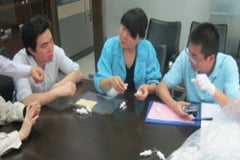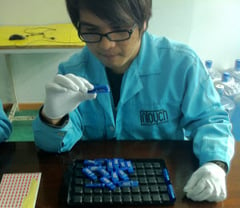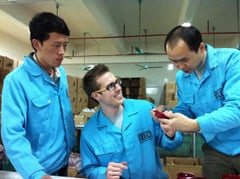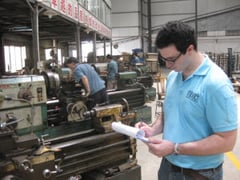We interview hundreds of potential quality inspectors each year, only accepting the finest candidates to join our team. So how do we determine who makes the cut? That depends on a recruitment screening process which starts from the very first interaction we have with the potential candidate. But even if a candidate does actually make it to the interview round (not an easy feat based on our super strict pre-screening criteria), you can bet that they are asked a set of interview questions which have been designed to quickly and effectively identify the All-Star candidates. Here are the five most important questions we ask:
5. Is it acceptable to take "red envelopes" or other small gifts from a factory, such as during Chinese New Year?
This is a very straight forward question, but how to interpret the answer that you get back is more complex. The things to look for here include:
- Does the applicant look you in the eye and remain calm during their response or do they start to look unsettled? An applicant that remains calm and can address this question clearly, without being frazzled, is strongly preferred.

- Although you may expect that an answer of "No, an inspector should never accept any red envelopes" is the preferred answer, it's not always true. One answer that I generally prefer to hear is that whilst accepting any kind of gift or money outside of Chinese New Year time is definitely not acceptable, during Chinese New Year it is normal, based on Chinese culture, to give and receive red packets. So, such kinds of activities may be acceptable.
- An answer like this tells you that the candidate is honest, and that's the most important thing when hiring a QC inspector. You can always train such an individual later on to understand that your company culture prohibits receiving gifts like this at any time, including CNY, if that is in fact your company culture (as it is for us at InTouch).
4. Give me an example of an inefficient process or procedure you noticed in a previous job or school, and tell me an example of how you would correct it?
This is a great interview question for nearly any role that you may be interviewing for, but I especially like it for the QC inspector positions. Key variables to consider in the applicant's response include:
- Your best quality inspectors (and employees in general) are the ones who recognize when improvements can be made in the organization and take the initiative to make such suggestions. This is especially challenging in the Chinese environment, where most people have a more "collective" way of looking at things.
- Answers to this question identify the ability of the potential employee to "think outside the box" and come up with solutions to a problem which they may not have faced before. Such attributes are often those of candidates that may start out as inspectors, but have management potential.
3. How can a company deal with corruption from a management perspective?
Since bribery and unethical behavior are among the most challenging issues in the QC and factory auditing industry, we believe in being especially diligent when asking such questions during the interview. Discussing the subject openly gives you, the interviewer, an opportunity to "feel out" the candidate as they respond to such questions.
For this question, in particular, there are a variety of responses you will hear; each one has benefits and drawbacks. There are also candidates that may have had so  little experience in the industry they have no possible strategies for controlling such corruption. Here are some of the answers we are looking for:
little experience in the industry they have no possible strategies for controlling such corruption. Here are some of the answers we are looking for:
- Culture – A company that builds a core culture of integrity, honesty, and hard work, is a company that has the foundation that allows for high integrity. So any comments that the candidate makes regarding building company culture are highly valued.
- Creating a system of double checks – this may include common strategies in the QC industries such as sending inspectors in teams as opposed to just solo, and also creating independent teams of internal auditors that work covertly to investigate the inspection teams.
- Rotating inspectors – I.e. Not regularly sending the same inspector back to the same location.
- What we DON'T like to hear as answers to this question and why:
- Just "tell" the inspectors that it's against the rules to take bribes (this is a rather low-level, non-actionable, answer).
- There's no way to control this kind of thing, because it's part of Chinese culture, and will always be the case.
2. The information we provide you for an inspection indicates that there are 5 different items to be inspected, each of 10,000 pieces. But when you arrive on site you find that there are actually 6 different items, each of 8,000 pieces.
What do you do?
 This is a simple one. We are looking for one answer: "Call my manager and ask them what I should do". An even better answer would be to respond that if the company does have a policy, which they have been trained on, for this kind of situation, then to follow that policy. But if not, then they would call their manager.
This is a simple one. We are looking for one answer: "Call my manager and ask them what I should do". An even better answer would be to respond that if the company does have a policy, which they have been trained on, for this kind of situation, then to follow that policy. But if not, then they would call their manager.
We don't want inspectors to assume they know the answers or the way to manage situations beyond the scope of their training. Also, we don't want employees who assume that since a similar situation was handled in a certain way at their previous employer, that it is acceptable to handle it the same way at InTouch.
1. What's the most important thing about working in teams?
This question is a little bit more wide open than the others. And we use this not only for hiring QC inspectors, but for other positions as well. This question will give you a good idea as to whether the candidate is procedure and organization-oriented, as opposed to a more emotional decision maker.
We find that the former traits are characteristics that tend to work well with our Western mentality, and we usually favor candidates with those tendencies.
Some answers to this question which indicate a strong organizational and procedural thinker include:
- Clear definition of roles and responsibilities
- Clear definition of the goal of the team and acceptance of the goal by all parties
- Creating tools that facilitate effective communication, providing strong feedback between members, and listening & evaluating
- Ensuring each member has the technical ability to perform their assigned role in the team
Some answers we don't like to hear include:
- Team spirit (you can have all the team spirit in the world but if you do not have the above qualities, you will not get anything done)
- Any answer that does not address the question properly, where the candidate starts to talk about themselves or why they are a good team member
Conclusion
In summation, when screening quality inspector candidates during the interview process, the interviewer should ALWAYS consider these three main points:
1. Integrity – Corruption has the potential to be a problem in any company in this industry that is not vigilant, particularly, if that company does business in China. An effective inspector is one that can recognize corruption in its various forms and remain impartial in their reporting.
2. Communication – Whether or not an inspector is alone in a factory, they are never working alone. They are always reporting to managers and working alongside factory staff during an audit. Thus, their ability to be organized, delegate and work in teams is paramount. A good candidate does not offer “team spirit” as the solution to working effectively with teams to get the job done.
3. Problem-solving – Although there are procedures in place to handle day-to-day situations and activities, inspectors are, on occasion, faced with a task they may not be sure how to handle. It is perfectly OK to ask a coworker or manager for help. What is NOT OK is making assumptions or taking a guess at the proper course of action. Quality inspections are technical and it is important that inspectors not only follow protocols, but also that they are not afraid to look to the guidance of others to solve problems.
What does it take to find the most qualified candidates for inspectors? Frame your interview around these main topics and you’re sure to find the right people.







